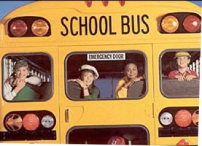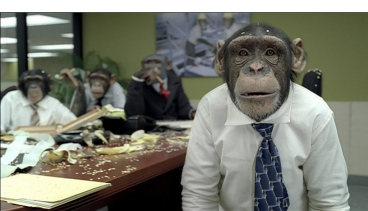The School Bus Won’t Wait
By John Greco
Originally published on May 21, 2012
Re-posted with permission from johnponders blog
 David was a tenured college professor. While an expert in his field, he knew very little about computers; just enough in fact to get on a network and ask for help. Fortunately, a more experienced user came to his aid, never failing to give just the right advice.
David was a tenured college professor. While an expert in his field, he knew very little about computers; just enough in fact to get on a network and ask for help. Fortunately, a more experienced user came to his aid, never failing to give just the right advice.
One morning, when a vexing problem was plaguing him, his expert advisor who had been on-line with him for over an hour, said, “I’ve got to go.” David pleaded with him, “You can’t leave me, we’ve almost found the solution.”
Across the electronic world came the next sentence: “You don’t understand, my school bus won’t wait for me.”
David thought for a moment, his curiosity mounting, “How old are you?” he asked.
“I’m twelve,” was the response on his screen, “and I’ll talk to you later.”
Source: Community Building: Renewing Spirit and Learning, Edited by Kazimierz Gozdz, (c) 1995.
 A few short years ago, we couldn’t have even imagined such a scenario. In the past, proximity and commonality brought us together. We had family and close friends; help came from familiar places.
A few short years ago, we couldn’t have even imagined such a scenario. In the past, proximity and commonality brought us together. We had family and close friends; help came from familiar places.
Today, help can come from anywhere, from anyone, at any time, on anything. Help can come from the most unlikely people. And from the most unlikely places.
A twelve year old across the globe can help a college professor.
There is great potential in the invisible network of an electronic community, no? Technology is enabling us to connect like never before, opening up possibilities like never before.
We can pretty clearly see the upside for problem solving and innovation, speed and progress, quality and quantity of work.
But just think of the possibilities for changing our attitudes; our prejudices and biases; of slowly dissolving bigotry, and discrimination; and racism, sexism, ageism …
Even the possibilities for relationships! Today, my son can play an online, real-time game with like-minded people from all across the world, and in so doing, develop a friendship with a girl a thousand miles away that has real meaning.
Gives new meaning to “the girl next door” doesn’t it? She can now be here, there, anywhere!
I can imagine a lot, but I can’t imagine what life will be like 100 years from now. You and I will never know. Even my mom’s upcoming fourth great-grandchild may not know.
I wonder who my mom’s fourth great-grandchild will have as friends and family? It certainly does suggest a different slant on “extended family” …
And I wonder who will be helping my mom’s fourth great-grandchild when she is an aging professional seeking help with the emerging technology of that time?
Technology. Adapting to change. And possibility.
As I age, and as technology advances, it is likely I will start falling behind. It is already happening. I have a cell phone that I only use to make telephone calls. ![]()
 And I already see that I’m not adapting fast enough to keep pace with the innovations. The technology school bus isn’t waiting for me!
And I already see that I’m not adapting fast enough to keep pace with the innovations. The technology school bus isn’t waiting for me!
But, as I age, I hope I can keep seeing the possibility. I will likely need help with this. I hope I can stay open-minded and aware enough to know that my mom’s fourth great-grandchild’s help will only be a click or two away.
Here’s hoping she can help me before she needs to leave for school!


 One particularly hungry monkey eagerly scampered up the pole, intent on retrieving a banana. Just as he reached out to grasp the banana, he was hit with a torrent of cold water from an overhead shower. With a squeal, the monkey abandoned its quest and retreated down the pole.
One particularly hungry monkey eagerly scampered up the pole, intent on retrieving a banana. Just as he reached out to grasp the banana, he was hit with a torrent of cold water from an overhead shower. With a squeal, the monkey abandoned its quest and retreated down the pole.  We, like our monkey friends, become conditioned. Don’t climb that pole! we learn, when we see what happens to those that do … Then we teach don’t climb that pole! to the newcomers we welcome into the organization, telling the story of what happened to our ambitious co-worker Moe when he climbed that pole it was like a cold shower stopped him right in his tracks! … We learn that we don’t need to climb the pole; we are growing sales and driving profits without climbing the pole; it over time becomes an afterthought, except of course to orient the new talent; and there comes a time when a newbie asks“Why don’t we climb the pole?”and we’re all kind of stumped “dunno; it’s just the way we do things around here!”
We, like our monkey friends, become conditioned. Don’t climb that pole! we learn, when we see what happens to those that do … Then we teach don’t climb that pole! to the newcomers we welcome into the organization, telling the story of what happened to our ambitious co-worker Moe when he climbed that pole it was like a cold shower stopped him right in his tracks! … We learn that we don’t need to climb the pole; we are growing sales and driving profits without climbing the pole; it over time becomes an afterthought, except of course to orient the new talent; and there comes a time when a newbie asks“Why don’t we climb the pole?”and we’re all kind of stumped “dunno; it’s just the way we do things around here!”